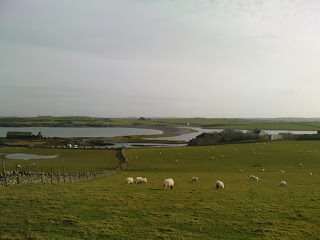Sometimes there just aren't enough hours left in the day to blog when there are so many demands on your time. January, February and March have been very busy months filled with an intensive period of work; birthday celebrations with family and friends and looking after a very sick, and much loved, pet. I'm now giving myself a little TLC in the hope that I might get over a virus that is now into its 4th week!
As I watch the sun emerging after a lazy and hazy start to the day, I'm looking at a chiffchaff noisily hopping around my garden willow tree, a male bullfinch picking at the buds and a coal tit singing from the uppermost branches. I can hear a blackcap singing from the dense foliage below. Birdwatching from home is also a favourite pastime of mine, whenever I get the chance, and I'm lucky to have a lovely garden to bring in a wide variety of birds. Wherever you live, you can make positive steps to encourage wildlife into your garden without spending a lot of money. If you'd like some advice about how you can do this then please contact me via my website links.
So what's been going on at Start Birding since my last post? Well, my regular class has been learning about wildfowl, wrens, goldcrests and resident bird song. I think members of the class will agree when I say that they can recognise most of the 16 initial songs that we have been working on with at least an additional 5 commonly heard songs that people know without actually realising it. Well done everyone!
In January I was asked to lead some local bird walks that will take place at Middleton Woods in Leeds this spring and summer - details will be posted later. Outdoor trips have included another visit to Yorkshire Wildlife Trust's Staveley reserve near Ripon to watch starlings and owls; a trip to Potteric Carr; a visit to RSPB Fairburn Ings and Wakefield's Calder Wetlands and another bird ringing session.
Ringing sessions have become a regular event at Start Birding and we are aiming to make this a twice yearly trip - one in the winter and another at post fledging time. This visit we were able to handle tree sparrows, blue tit, robin, great tit and dunnock. Some of the class members had the opportunity to place a tiny ring on a bird, with careful supervision from our expert ringer, then release their bird back into the wild.
In February I led a trip to the Welsh island of Anglesey to do some winter birding around the coast and inland waters. During this visit we explored the little known Anglesey fenland which covers a surprisingly large area and completely changes your perspective of the size of the island. Regular Anglesey birds such as raven, chough, shag and black guillemot were supplemented by spotted redshank, merlin, hen harrier, purple sandpiper, knot, mergansers, eider, goldeneye, pintail, gannet, fulmar, buzzard, brent geese and many more. On one evening we visited the famous raven roost on the south of the island which was a fantastic sight. On our last evening we were chased off the island by a fast moving sea fret and retreated to the RSPB Conwy reserve on the Welsh mainland.
Last week I took a group to Mickletown Ings and spent some time looking across at the new St Aidan's reserve that will very soon become one of the region's best RSPB reserves. On our travels one of the group members came across a long-tailed tit building a nest and we were able to have a really good look (from a suitable distance) at the materials that had been used.
The 2012 year list is really looking good. Since the start of the year class members have not only seen different species of birds but have also been able to look at the difference between races. Our best example of this has been the winter geese. We have managed to see Taiga and Tundra bean geese; Greenland and European white-fronted geese and pale bellied and dark bellied brent geese.
As our spring migrants have already started arriving, and we have now said goodbye to winter, future indoor and outdoor classes will focus summer visitors such as warblers; cuckoo, swallows, martins and swifts. Here are home I'm hoping that we will have started a new swift colony by the end of the summer so I'll keep you posted about this. The frogs have spawned in my pond and I'm just waiting for my mallards to arrive - fingers crossed.
If you are interested in joining a class to learn more about birds, and how to get the best out of your birdwatching, then please contact me for more details at linda.jenkinson1@ntlworld.com.




No comments:
Post a Comment